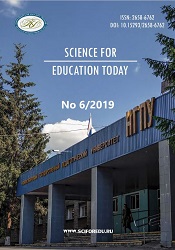Комплексное научное психолого-педагогическое сопровождение одаренных детей в социально-образовательном пространстве: обоснование модели
Complex psychological and educational support for gifted children in social and educational space: Description of the model
Author(s): Galina Leonidovna Parfenova, Olga Gennadievna Kholodkova, Julia Anatolievna MelnikovaSubject(s): School education, Educational Psychology, Organizational Psychology, Sociology of Education
Published by: Новосибирский государственный педагогический университет
Keywords: Giftedness; Gifted personality; Management model; Management system; Development of giftedness in children; Region-centered activities of the University; Developing giftedness
Summary/Abstract: Introduction. The article investigates structural, functional, logistic, and content features of complex psychological and educational support for gifted children in the social and educational space of the Altai region. The purpose of the research is to identify the characteristic features of complex psychological and educational support for gifted children in the social and educational space in order to develop a regional management model. Materials and Methods. The study was conducted relying on the system-based, cultural and humanistic approaches and employed the following research methods: theoretical (analysis, comparison, generalization, and prediction); structural-functional, and structural-descriptive ones. Results. The authors identified the following key features of complex psychological and educational support for gifted children in social and educational space in order to develop an effective regional management model: 1) implementing the mechanisms of support, development, and guidance for gifted individuals should be one of the effectiveness criteria within a regional system of social support and welfare; 2) management of support and guidance should be prospective and prognostic, taking into account the specifics of the region and the peculiarities of mental, age, and individual development of gifted children and difficulties in their self-realization; 3) Implementation of international practices in the field of state, social, and legal support for gifted individuals through organizational and coordinating activities of leading regional higher educational institutions; 4) the nature of support should be multi-level, continuous, interdisciplinary, and subject-centered; 5) state support of teachers and psychological service of education are the main resources of complex support for gifted children in the region. Conclusions. The research results can be used in the fields of education, training, development, career-guidance of gifted children, and psychological and educational support for gifted children.
Journal: Science for Education Today
- Issue Year: 9/2019
- Issue No: 6
- Page Range: 88-105
- Page Count: 18
- Language: Russian

